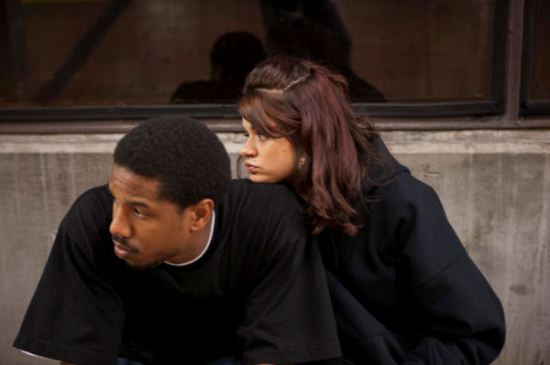
In less than ninety minutes, first-time director Ryan Coogler’s straightforward yet piercing Fruitvale Station introduces you to your new best friend, lets you hang out with him for a while, shows him at his best and worst, and then punches you in the chest while forcing you to watch helplessly as his life is taken right in front of you.
Based on the true story of Oscar Grant III, whose tragedy bears faint echoes of a certain other tragedy that ruled headlines earlier this year, Fruitvale follows the ups and downs of a day in Grant’s life: the joy of planning his mom’s birthday dinner; the simple pleasures of doting on his girlfriend and daughter; the frustration with unemployment and bills; and the temptation to return to the old ways that once earned him a stint in prison. Michael B. Jordan had already impressed me previously in The Wire and Chronicle, but excels here with an approach that’s no less charismatic than either young Wallace or class president Steve. With a wealth of nuance and no small amount of heartbreak, he embodies yet another young man deprived of a promising future, unaware that his remaining minutes are counting down like a veritable red digital readout.
Grant’s final hours played out on a New Year’s Eve subway ride through Oakland that ended with Grant and friends accosted by overreacting police officers (Kevin Durand and One Tree Hill‘s Chad Michael Murray, their characters’ names curiously changed from those of the original officers’), one of whom would be responsible for killing him while he was indisputably laid unarmed and face-down on the pavement, captured live on civilian phone video for all to see. The moment itself is shaky and chaotic, then prolonged to the point of agonizing exhaustion as Grant, denied the Hollywood courtesy of a grandiose slo-mo death scene or inspiring deathbed speech, holds on temporarily through hours of overnight surgery that would ultimately prove futile.
Coogler and his fine cast make economical use of their time and talents to draw you into Grant’s world, compromised in places and blessed in others. Melonie Diaz stands her ground in love and consternation as the responsible, faithful girlfriend who gives Grant a reason to be a better man, staying by his side for better or for worse, for as long as fate would allow. As Grant’s mom, Oscar winner Octavia Spencer (who stole large portions of The Help) allows for sweet sentimentality as long as her son is on the right path, practically burns inside during a tough-love prison-visit flashback, and brought me to the brink of unmanly eye-water when she gathers all his friends and family in the hospital waiting room for a moment of heartfelt prayer, to which the answer from above was anything but a simple yes.
If I were forced to nitpick, I’ll admit there were a few scenes in which Coogler comes a little too close to campaigning for Grant’s sainthood. A scene involving a wounded dog could be argued to function on a symbolic level, but it’s superfluous and perilously close to over-the-top. By that point it’s already understood that Grant wasn’t evil, wasn’t a clichéd thug, and meant well deep down inside even as he struggled to stay on the right path. If he loved animals, great, but the randomness of that part jarred me out of the movie for a minute.
Within seconds, though, I was drawn right back into the rest of Grant’s story, and riveted until it — and his life — were devastatingly cut short. All told, the testimony of Fruitvale Station leaves you with a painful scrapbook of those left behind, sorrowful insight into a man who deserved to be more than a statistic, and an infuriating requiem against a fallen world that sets the stage for such horrors all too easily.
To answer the burning question that MCC is always happy to verify: no, there’s no scene after the Fruitvale Station end credits, but they’re a short, welcome respite that allow you a few minutes to compose yourself before you return to you own life and savor your blessings.
Reblogged this on SoshiTech.
LikeLike
Reblogged this on Blog of an e-marketer by Main Uddin.
LikeLike